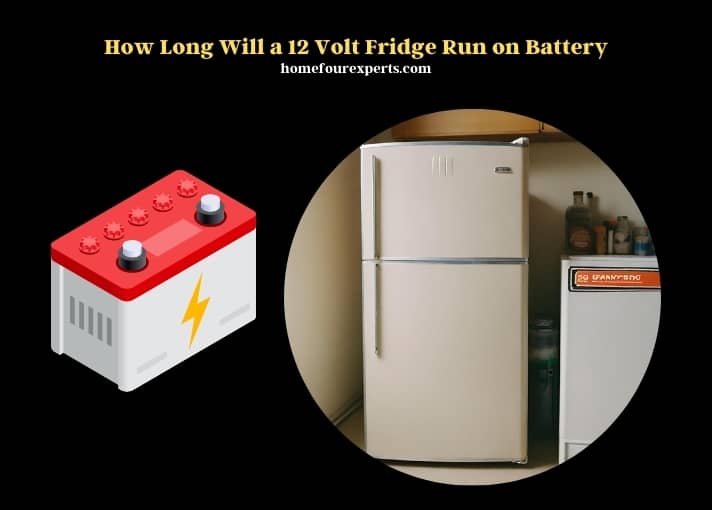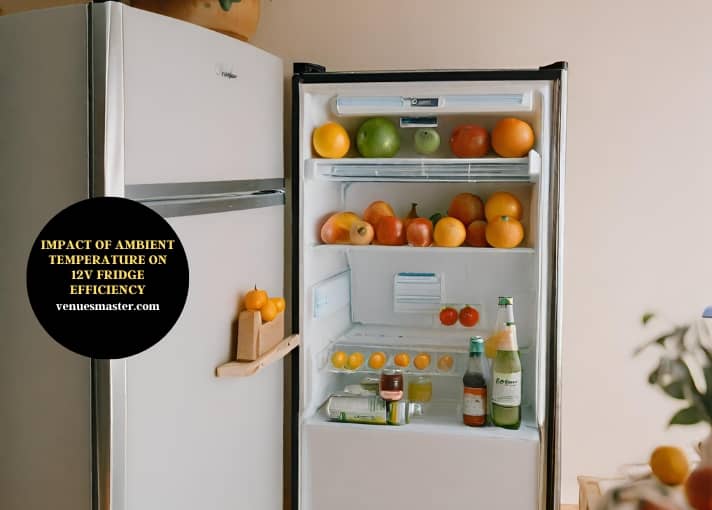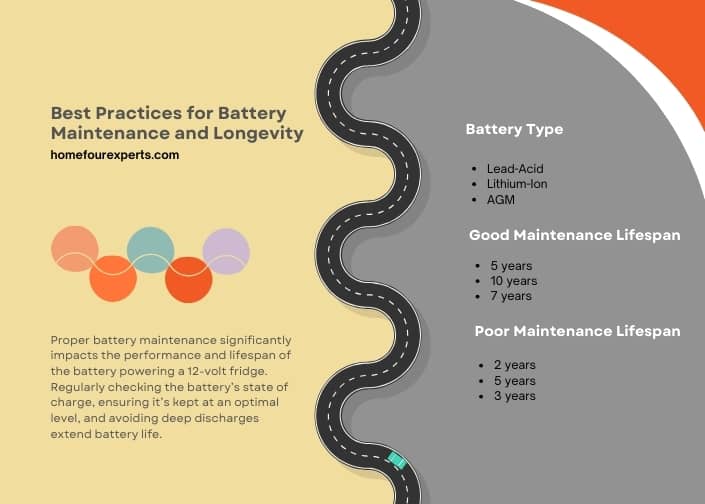The duration a 12-volt fridge can run on a battery varies greatly, typically ranging from 20 to 50 hours. This time frame depends on several factors, including the battery’s capacity and the fridge’s power consumption.
The operational time of a 12-volt fridge on a single battery charge is influenced by multiple variables. Key among these is the battery’s ampere-hour (Ah) rating, which indicates the amount of energy the battery can store and deliver. For instance, a fridge that consumes 1 ampere per hour, paired with a 100Ah battery, can theoretically run for 100 hours.
Real-world conditions like the fridge’s efficiency, ambient temperature, and the frequency of opening the fridge door play significant roles in actual battery life.

Battery type also impacts longevity. Lithium-ion batteries, known for their high energy density and low self-discharge rate, are more efficient compared to traditional lead-acid batteries. The efficiency of the fridge itself, determined by factors like insulation quality and compressor type, also affects how long it can run on a battery.
External factors such as ambient temperature can cause the fridge to work harder to maintain its internal temperature, thereby reducing battery life. Regular maintenance and proper charging practices are crucial for maximizing battery efficiency and lifespan.
In summary, while the specific duration varies, understanding and optimizing these factors can significantly enhance the performance of a 12-volt fridge running on battery power.
Calculating Optimal Battery Capacity for 12V Fridges
The longevity of a 12-volt fridge on a single battery charge primarily depends on the battery’s capacity and the fridge’s power consumption. To determine the appropriate battery size, one must consider the fridge’s average power draw, typically measured in watts.
Different types of batteries, like lead-acid, lithium-ion, or AGM (Absorbent Glass Mat), offer varying efficiencies and capacities. The fridge’s power consumption varies based on its size, insulation quality, and compressor type. A larger fridge or one with poor insulation will consume more power.
Calculating the battery capacity involves understanding the fridge’s power requirements and the battery’s discharge characteristics. For instance, a fridge drawing 50 watts per hour will require a battery that can sustain this draw for the desired period. A 100Ah (amp-hour) battery, under ideal conditions, could theoretically run the fridge for about 48 hours. Factors like battery age, temperature, and inverter efficiency can affect this duration.
Energy Efficiency in 12 Volt Fridges
Energy efficiency in 12-volt fridges is pivotal for prolonged battery life. Modern 12V fridges often come with improved insulation and efficient compressors, reducing energy consumption. The energy efficiency of these fridges is typically rated in kWh (kilowatt-hours) per year.
Comparing these ratings with conventional refrigerators reveals significant differences in power usage. For example, a standard home refrigerator might use 1-2 kWh per day, while a well-insulated 12V fridge could use as little as 0.25 kWh.
Implementing energy-saving measures, such as minimizing door opening, proper ventilation, and setting realistic temperature levels, can further reduce power consumption. The impact of these measures is more pronounced in off-grid scenarios where power conservation is crucial.
Impact of Ambient Temperature on 12V Fridge Efficiency

Ambient temperature plays a critical role in the performance of a 12-volt fridge. Higher external temperatures can lead the fridge to work harder, increasing power consumption. Conversely, in cooler environments, the fridge operates more efficiently.
Maintaining an optimal internal temperature setting, usually between 3°C and 5°C, ensures efficient operation. Effective thermal insulation in the fridge minimizes the influence of external temperature fluctuations.
Strategies to maintain consistent internal temperatures include avoiding direct sunlight on the fridge, ensuring adequate ventilation, and pre-cooling contents before placing them in the fridge. The following table illustrates the relationship between ambient temperature and power usage:
| Ambient Temperature (°C) | Average Power Usage (Watts) |
| 10 | 30 |
| 20 | 40 |
| 30 | 50 |
| 40 | 60 |
Best Practices for Battery Maintenance and Longevity
Proper battery maintenance significantly impacts the performance and lifespan of the battery powering a 12-volt fridge. Regularly checking the battery’s state of charge, ensuring it’s kept at an optimal level, and avoiding deep discharges extend battery life. Different battery types require specific maintenance routines.
For instance, lead-acid batteries need periodic topping up with distilled water, while lithium-ion batteries benefit from regular, complete charge cycles. The following table shows the expected lifespan of different battery types under various maintenance regimes:
| Battery Type | Good Maintenance Lifespan | Poor Maintenance Lifespan |
| Lead-Acid | 5 years | 2 years |
| Lithium-Ion | 10 years | 5 years |
| AGM | 7 years | 3 years |

Harnessing Solar Power with 12V Fridges
Integrating solar power with 12-volt fridges offers a sustainable and efficient way to run the appliance, especially in remote or off-grid locations. Solar panels convert sunlight into electrical energy, which can be stored in batteries to power the fridge. The compatibility of the solar setup with the fridge’s power requirements is crucial.
A typical setup might include a 100W solar panel paired with a 100Ah battery, sufficient for most small to medium-sized 12V fridges. The initial cost of setting up solar panels is offset by the long-term savings and environmental benefits. Case studies of successful solar-powered fridge installations demonstrate the feasibility and efficiency of this approach, especially in areas with ample sunlight.
FAQs
Can Inverter Type Affect Fridge Battery Life?
The type of inverter used can significantly influence how long a 12-volt fridge runs on a battery. Inverters convert the DC power from the battery to AC power, which the fridge uses. Pure sine wave inverters are more efficient and better suited for sensitive electronic devices like a fridge.
They ensure a smoother and more consistent power supply, reducing energy loss and extending battery life. On the other hand, modified sine wave inverters might be less efficient and could lead to increased power consumption, thereby reducing the fridge’s run time on a single battery charge.
Does Fridge Size Impact Battery Duration?
The size of the fridge is a crucial factor in determining its battery duration. Larger fridges have a greater internal volume to cool, leading to higher power consumption. This increased demand for power means the battery will deplete faster.
In contrast, smaller fridges require less energy to maintain their internal temperature, allowing the battery to last longer. Therefore, choosing a fridge size that aligns with your needs and battery capacity is essential for optimizing battery life.
What Role Does Fridge Content Play in Battery Usage?
The contents of a 12-volt fridge can affect how long it runs on a battery. A fully stocked fridge maintains its cool temperature more efficiently than an empty one, as the items inside help to absorb and retain the cold.
This means the compressor needs to work less frequently, conserving battery power. Conversely, frequently opening the fridge or stocking it with warm items can cause the compressor to work harder and more often, draining the battery more quickly.
How Does Charging Method Influence Battery Life?
The method used to charge the fridge’s battery plays a significant role in its overall lifespan and efficiency. Using a high-quality charger that correctly matches the battery type ensures efficient charging and can extend the battery’s life.
Overcharging or undercharging can lead to reduced battery capacity and a shorter lifespan. Solar chargers, for instance, offer an eco-friendly charging method but require adequate sunlight to be effective. Regular and proper charging practices are key to maintaining battery health and longevity.
Can External Insulation Enhance Battery Efficiency?
External insulation can greatly enhance the efficiency of a 12-volt fridge running on a battery. Adding insulation around the fridge reduces the heat exchange with the surrounding environment.
This means the fridge’s compressor doesn’t have to work as hard to maintain the internal temperature, leading to lower power consumption and longer battery life. Especially in warmer climates or during hot weather, external insulation can be a simple yet effective way to improve battery efficiency.
Is There a Difference in Battery Drain Between Day and Night?
The external temperature difference between day and night can affect how long a 12-volt fridge runs on a battery. During the day, higher ambient temperatures can cause the fridge to work harder to maintain its cool temperature, leading to quicker battery drain.
At night, cooler temperatures mean the fridge may require less energy to stay cold, conserving battery power. This variance is particularly noticeable in outdoor or non-climate-controlled environments, making it an important consideration for those using 12-volt fridges in mobile setups or off-grid situations.
Summary
Maximizing the battery life of a 12-volt fridge involves understanding and optimizing various factors. Calculating the right battery capacity, ensuring energy-efficient fridge operation, considering the impact of ambient temperature, maintaining the battery, and exploring solar power integration are key strategies. By addressing these aspects, one can significantly enhance the performance and longevity of a 12V fridge running on a battery.
About This Writer

Hi, I am Eric Devin and I am a professional interior architect. Since childhood, I've always enjoyed DIY projects! And, I have loved to solve simple household problems using essential tools and equipment. I have also acquired a lot of information about basic household tools settings by working with contractors.